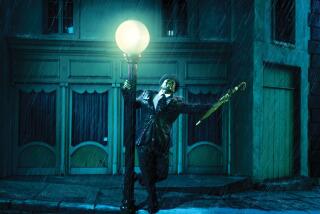I’m kind of a sole wandering minstrel with a camera.
- Share via
When he was a teen-ager, Les August was hired by the National Park Service to photograph the Grand Canyon. He went on to get a bachelor’s degree in geology at Stanford University, did a five-year hitch in the Army during World War II and returned to get a bachelor’s degree at USC in finance. He now runs August Enterprises in Calabasas, where he and his wife, Jean, live. But every Sunday, he hits the trail with his camera to get one more nature photograph for his collection.
I essentially deal with the management of risk and the financing of risk in the transportation business. We also do studies in the interface of regulation, transportation and insurance. If you live a very intense business life, you’ve got to have some anchor of sanity. My goodness, you’ve got to have some alternative.
At my age, photographing birds and flowers is a pretty good alternative. It gets me out in the open. I get to move around a lot, and I get to see things that fascinate me. I can make photographs in almost any desolate place in the world. It’s not like golf, where I have to have a golf course. And it saves a lot of money on bar bills.
I’m kind of a sole wandering minstrel with a camera. I think you have to enjoy being a recluse. Certainly, you can’t bring a brass band and a catering wagon with you and do these things. I have to admit, I like the solitude. It’s 180 degrees away from my daily business life. It’s a completely delightful antidote.
I’m not like the amateur photographer who has tons and tons of slides. There is something compulsive about these people to put a herd of folks he doesn’t know too well in a dark room and allow them to expire temporarily while he puts on these slides. I do things a little bit different. I make some color prints. If you’re interested, you can see the pictures; if you’re not, no sweat.
When I look through the viewfinder, I’m trying to find something that I want other people to see that they don’t ever get to see. I’m trying to make a statement: “Hey! look at this flower, it is absolutely unique. It’s something you’ve probably walked over a thousand times but look at this thing!” Here I am on my hands and knees looking at something that everybody walks over.
I’m also trying to tell the story that there are beautiful things out there that are going to disappear if we don’t take some pains to create an environment where they can be protected for all future time. The out-of-doors is a dwindling resource. It deserves more attention by people who are concerned about its preservation and significance.
There’s one bird I’ve been observing now for about three months. It was a magnificent adult, a black crowned night heron. I had managed to photograph it, although it’s an extremely secretive bird and very hard to get out in the bright sunlight where you could do a really good job of taking a picture. It has very large eyes because it depends upon night vision for living. This heron and the three others with him are quite rare in this area.
At 6 o’clock in the morning I came across this poor bird hanging from a piece of monofilament in a tree, where it had died. Some irresponsible person had laid a snare of monofilament fishing line and managed to hook the bird by the foot. The bird apparently escaped the grasp of its tormentor and flew away to the tree, where it got tangled up in the line and hanged himself.
The sense of loss to me was great, but the loss to the area was even greater. Not only did we lose one very rare bird, but the death of that bird sent the other three birds away. So we have no black crowned night herons here anymore. They’ve all been terrified and run off.
You know, we’re given a lot of gifts as human beings, most of which we never really appreciate. I feel that our wildlife, birds and plants are part of that heritage, and I look on them as an extension of the gift of life. This is very precious, sacred and important. It’s very disappointing to find that people by and large don’t really have a sensitivity that requires them to look on these marvelous things with awe.
More to Read
Sign up for The Wild
We’ll help you find the best places to hike, bike and run, as well as the perfect silent spots for meditation and yoga.
You may occasionally receive promotional content from the Los Angeles Times.






